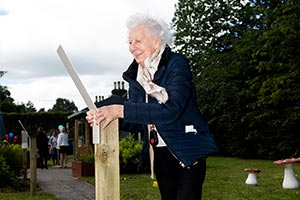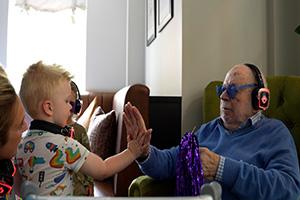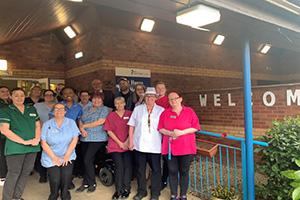Funding to help care home residents to sit less and move more
Walking charity Paths for All has been awarded £50,000 to expand its award-winning Care About Walking project with care homes in Perth and Kinross.
Partnering with the University of Stirling’s Faculty of Social Sciences, the two-year Digging Deeper research grant, from the Life Changes Trust, will look at the integration of physical activity into the culture of care homes.
The current Covid-19 pandemic is an enormous challenge for care home staff to manage. Helping residents to be active and enjoy social interaction whilst social distancing is important to avoid deconditioning. This is where residents lose functional capabilities like getting dressed, sitting into a chair or being able to walk to the toilet.
The funding will enable a research assistant to be employed to investigate how physical activity can be made more accessible for anyone living in a care home. This will involve working with people living with dementia, care home residents, staff, and family members across 10 care homes in Perth and Kinross. The project will produce a model to make everyday movement a core part of a care home’s culture.
Since 2018, Paths for All has delivered its Care About Walking project, working closely with Perth and Kinross Health and Social Care Partnership, local care homes, residents and staff to explore how adults can be empowered to walk more and perform strength and balance exercises.
Walking activities, tailored to each resident’s needs, have included:
Led Health Walks, or bench to bench walks, corridor walks, and walks around the garden
Encouraging family members to take residents out for a walk on their visits
Bingo, scavenger, nature, or heritage walks to help residents look for birds, flowers, and landmarks
Performing strength and balance exercises when walking indoors or outdoors.
The Care About Walking project has a resource pack with the following items:
- A guidance note for care home staff
- An information booklet for residents and family members about the health benefits of walking and how to get started
- A set of posters with different designs and messages to promote walking around the care home
- An A3 wall chart to allow residents to set goals, track when and where they have walked and log the number of steps walked using a pedometer, accelerometer, or fitness tracker.
The pack is available free to download on the Paths for All website www.pathsforall.org.uk/care-about-walking.
Care home residents can spend up to 97% of their day sitting. This can affect their balance, their ability to rise from a chair and their walking capabilities - leading to an increased risk of falls.
Approximately 90,000 people are currently living with dementia in Scotland, with an estimated cost to the Scottish economy of £1.2billion per annum (Department of Health 2015; Alzheimer Scotland 2016; Scottish Government 2017). The number of people living with dementia in Scotland is expected to increase to approximately 164,000 by 2036 (Scottish Public Health Observatory). Residents living with dementia in a care home increased from 54% at 31 March 2007 to 62% at 31 March 2017 (ISD – Care Home Census for Adults in Scotland, September 2018).
For care home residents to have an improved quality of life during their stay physical activity needs to be key part of the care home culture.
Dr Grant Gibson, lecturer in dementia studies in the University of Stirling’s Faculty of Social Sciences, believes researching Paths for All’s Care About Walking project will help to gather new knowledge. He said: “People living with dementia who are resident in care homes are a group which has been under-researched.”
“When looking at traditional models of care, research over decades reports that care home residents spend most of their time inactive. However, research exploring the specific opportunities and challenges arising when implementing physical activities for people with dementia within care homes is rare.
“Lack of engagement in physical activity has detrimental effects on physical and psychological health and quality of life and contributes to social isolation. This has implications for the health, wellbeing, quality of life and social engagement of care home residents, including those living with dementia.”
Arlene Crockett from the Life Changes Trust said. “It is important that the needs of residents living with dementia in care homes are better understood. This research will help to better inform policy and practice. This will assist the design of both the indoor and outdoor care home environment to offer more exercise opportunities which will improve the lives of people living with dementia.”
Regular walking offers many benefits for people living with dementia, such as:
- Improved sleep
- Reduced risk of high blood pressure, heart disease, stroke, type 2 diabetes, and osteoporosis
- Improved physical fitness
- Stronger muscles and flexible joints
- Increased self-esteem
- Improved memory, confidence, and mood
- Maintenance of independence and functional fitness
Paths for All’s Dementia Friendly Walking Project won sportscotland’s 2019 Coaching for an Active Life award. It is supported by The Life Changes Trust, The National Lottery Community Fund, William Grant Foundation, The Robertson Trust, Spirit of 2012, sportscotland and the Scottish Government.
For further information please contact Paths for All’s Dementia Friendly Walking team at dementiafriendly@pathsforall.org.uk or on 07806 859 972.





